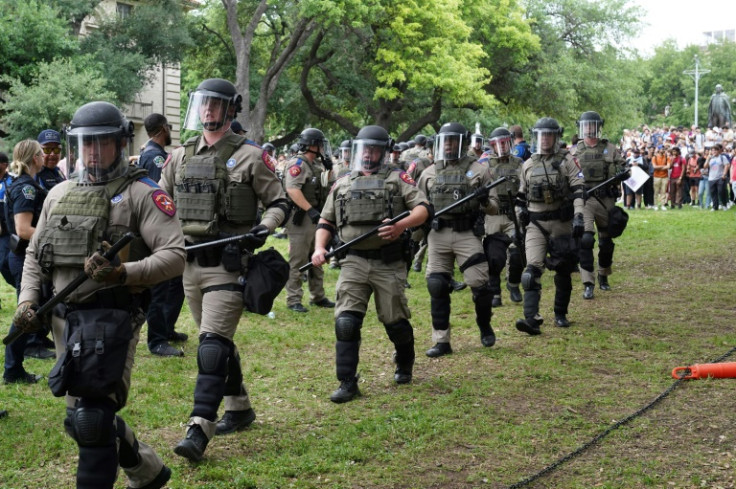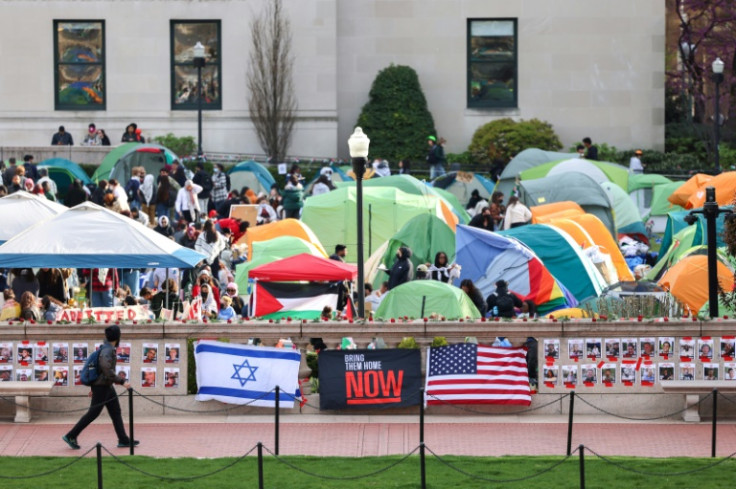Pro-Palestinian Protests Spread At US Universities

Spiraling pro-Palestinian protests that are rocking universities across the United States spread to more campuses Wednesday, triggering suggestions from a senior Republican leader that the National Guard could be brought in.
The comments from House Speaker Mike Johnson are likely to evoke strong emotions in a country where the 1970 killing by National Guardsmen of unarmed students protesting the Vietnam War lives on in folk memory.
Demonstrations erupted at the University of Southern California on Wednesday, and in Texas, where a tense stand-off developed between students and police in riot gear, with more than 20 people detained.
It was the latest confrontation between law enforcement and students angry at the mounting death toll in Israel's war against Hamas.
The movement began at Columbia University in New York where dozens of arrest were made last week after university authorities called in police to quell an occupation that Jewish students said was threatening and anti-Semitic.
Johnson told reporters at Columbia that if the demonstrations were not contained quickly it would be "an appropriate time for the National Guard."
He said he intended to demand US President Joe Biden "take action," and warned that the demonstrations "place a target on the backs of Jewish students in the United States."
White House spokeswoman Karine Jean-Pierre said Biden backed free speech.
"The president believes that free speech, debate and nondiscrimination on college campuses are important," she told reporters.
US ally Israel launched its war in Gaza after the Hamas attack on October 7 that left around 1,170 people dead, according to an AFP tally of Israeli official figures.
Student protesters say they are expressing solidarity with Palestinians in Gaza, where the death toll has topped 34,200, according to the Hamas-run health ministry, and are calling on Columbia and other universities to divest from companies with ties to Israel.
The demonstrators -- including a number of Jewish students -- have disavowed instances of anti-Semitism.
But pro-Israel supporters, and others worried about campus safety, have pointed to anti-Semitic incidents and argued that campuses are encouraging intimidation and hate speech.
Johnson's visit to Columbia came as Texas deployed police in riot gear at the University of Texas in Austin where hundreds of protesters staged a boisterous walkout, chanting "down with occupation."
Police said they had arrested more than 20 people, with the state's governor Greg Abbott urging swift punishment.
"These protesters belong in jail," he wrote on social media.
"Students joining in hate-filled, antisemitic protests at any public college or university in Texas should be expelled."
Police were on scene in Los Angeles after hundreds of students began what they called an occupation on the campus of the University of Southern California.
Students chanted "Free free Palestine" as well as the controversial slogan "From the river to the sea, Palestine will be free," which some interpret as calling for the destruction of the state of Israel.
"We're all just trying to advocate for our brothers and sisters in Palestine who just don't have voice right now," biology student Yaseen El-Magharbel told AFP.
The university said it was closing the campus to outside visitors, though classes and other activities would continue.
Students have also launched protests at schools including Yale, MIT, UC Berkeley, the University of Michigan and Brown.
Social media images showed an encampment taking shape at Harvard University.
Classes were moved online and other on-campus activities canceled at California State Polytechnic University, Humboldt, after protesters barricaded themselves in a campus building.
More than 130 people were arrested at a pro-Palestinian protest at New York University Monday night.
And police at the University of Minnesota reportedly detained nine people at an encampment.
NBC reported that the FBI is coordinating with universities over anti-Semitic threats and possible violence in connection with the ongoing wave of protests.
Before Johnson's visit to Columbia an uneasy truce was in place between students and officials.
The university had set a deadline of midnight Tuesday to disperse, but as more people joined the protest the school gave a 48-our extension, students said on social media.
They agreed to the ongoing talks after the school promised not to call the police or National Guard, organizers with Columbia University Apartheid Divest said.
"We fear that Columbia is risking a second Jackson State or Kent State massacre," the group said in the social media post.
In 1970, demonstrations at Kent State University in Ohio were met with deadly force from the National Guard, who fired into a crowd, killing four unarmed students and wounding nine.
Eleven days later, Jackson State in Mississippi also saw police confront student protesters and open fire, killing two and injuring 12.

© Copyright AFP 2024. All rights reserved.





















